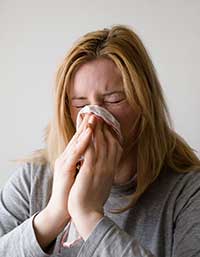Symptoms of Allergies: When to Seek Medical Help
 Nearly all of us have experienced them at one time or another. The runny nose, itchy, watery eyes, and sneezing.
Nearly all of us have experienced them at one time or another. The runny nose, itchy, watery eyes, and sneezing.
Symptoms of allergies can strike anytime or anyplace, depending on what the allergy trigger is for an individual. Most allergies are not serious, and can be easily treated at home with homeopathic remedies, over the counter medications, or simple avoidance of the triggers. However, there are some people who have serious allergies that can become life-threatening if they are not treated immediately. This is why it is important to understand the difference between mild, moderate and severe allergy symptoms, and when a health care professional should be involved in the treatment plan.
Mild Symptoms of Allergies
The milder symptoms of allergies are the ones that most of us will experience at one time or another. These symptoms might include itchy, watery eyes and nasal congestion. They can also include a localized skin rash or hives. In the case of milder allergy symptoms, the condition does not spread to other parts of the body. You can usually treat your symptoms effectively at home, using antihistamines or nasal decongestants. Other possible treatment options include eye drops, or topical creams for skin rashes. Most of the time, mild symptoms of allergies do not require a doctor’s care, unless the condition lasts for longer than a couple of weeks.
Moderate and Severe Symptoms of Allergies
When symptoms of allergies become moderate to severe, they can spread to other parts of the body. They can also become more dangerous and even life-threatening in some situations. Moderate symptoms of allergies can include itching and difficulty breathing. More severe symptoms might include swelling in various areas of the body, which can make swallowing and breathing difficult. You might also experience digestive symptoms like nausea, vomiting and diarrhea. In some cases mental clarity becomes compromised and you might feel dizzy, fuzzy or confused. If you begin to experience any of these symptoms of allergies, it is important to seek medical care immediately. These symptoms could be an indication of anaphylaxis, which is a potentially life-threatening condition.
In most cases, symptoms of allergies are mild and can be effectively treated with over the counter medications and home remedies. However, it is good to know what more severe allergy symptoms look like, so you will be prepared to seek medical help if the situation ever arises. Quick action can mean the difference between life and death for those who suffer from severe allergy symptoms.

